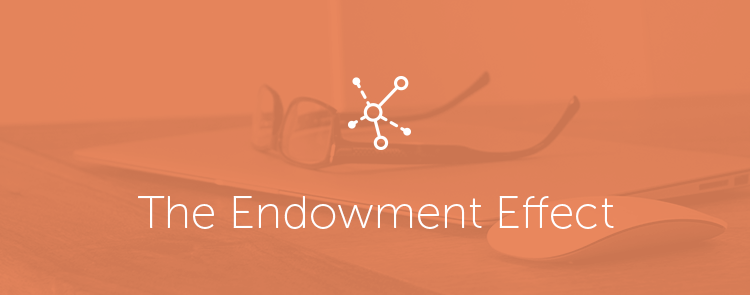In 1990, economists Richard Thaler, Daniel Kahneman, and Jack Knetsch conducted an experiment at Cornell University. They gathered a group of students and gave half a Cornell University coffee cup (retail value $6.00) and nothing to the other group of students.
They then asked the coffee cup group and the no-cup group to set selling and buying prices for the mugs. The results were very interesting to the economists. The students who had mugs, refused to sell for less than $5.25. The students who didn’t have the mugs refused to buy for more than $2.75.
What causes the discrepancy? This is whats’ called the endowment effect.
By Thaler’s definition it is “goods that are included in one’s endowment – that is, goods that one owns – are valued more highly than identical goods not held in the endowment.”
Ownership Means Something
The key discovery of the studies by Thaler et. all is that in the simplest terms, when we build an emotional connection with something, we think it’s worth more than something that is the same in every single way except one, it’s not ours.
This one could be one of the reasons why you’ve got a closet full of old clothes that don’t fit anymore, a garage full of golf clubs, or an email inbox with 5,398 messages.
It’s very hard for us to part with things we have because we’ve inflated their value over time. Every time you go to delete a message, or donate those clubs to Goodwill and change your mind, you’re strengthening that emotional (albeit irrational) connection you’ve established.
It’s because of this emotional connection that we’ve identified the endowment effect as one of the six key factors that drive reveal marketing.
Another key factor here is active engagement. Brands who have campaigns that want users to actively participate, even if it is just a click, have higher engagement rates and build that feeling of ownership at the same time.
Marketers can look to the endowment effect as something they can use in their campaigns to help increase the feeling of ownership in their customers.
How Marketers Can Use the Endowment Effect
So how can marketers create this feeling of value and emotional connection with their customers? By grabbing their attention right from the start.
You’ll see brands doing this by offering prizes. When brands and marketers give customers a chance to “earn” a prize, they feel a far greater level of ownership and emotional attachment to it than they would otherwise.
But prizes aren’t the only way to use the endowment effect.
Here’s a recent campaign from Amazon. They sent out an email to Prime members asking them to watch a series of pilots and pick the next Amazon Original Series.
Will anyone who watches these shows get a prize? Nope. But they will feel ownership, and thus an emotional connection over the process.
You can be sure that if someone watched a pilot and rated it with hopes of it becoming a series, they will be far more invested and likely to watch it than someone who didn’t go through the process from the start.
This is a way Amazon can draw in their customers and make them feel like they are more a part of the process.
Bringing it Together
In order to really hit those emotional connections, marketers need to create campaigns that give customers ownership. When they continuously build that emotional connection, it helps consumers to place a higher value in their products and brand over time.

